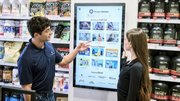Blog
Driving loyalty and sales in 2020 with the latest POS tech
Chris Lybeer, chief strategy and marketing officer for Revel Systems, explains why retailers are turning to point-of-sale technologies to improve the speed, convenience, and transparency of customer service as they strive to better manage relationships.

January 27, 2020 by Chris Lybeer — Chief Strategy Officer, Revel Systems
A tidal wave of new sales and ordering technologies are bearing down on retail brands. With the new year upon us, it is only natural that merchants are looking to these technologies to improve the speed, convenience, and transparency of customer service as they strive to better manage relationships and beat the competition.
A key part of creating an engine for sales and customer satisfaction lies with the integration of point of sale solutions with both back-end marketing and operational processes. Blending technology into customer interactions makes it possible to bridge the gap between the traditional retail marketplace and a truly immersive shopping experience.
For retailers looking to maximize each customer touch point, the effects on sales and profitability make POS implementation a simple way to adapt a business to the prevailing retail trends. It also translates into a substantial return on investment, as merchants typically spend 0.9 % or less of overall sales to acquire the technology and use it.
Driving revenue through speed and productivity
By eliminating written or verbally-communicated orders, retailers can significantly improve speed and accuracy, as well as reduce costly human errors when conveying orders to fulfillment. As they look to drive out costs and inefficiency in the year ahead, this takes on an even greater dimension.
Moreover, mobile POS terminals give retailers the option to reduce the number of fixed checkout points, expanding the number of "lanes" at busy times. This also makes it easier for sales staff to provide personalized service to customers as they look to upsell and cross-sell with the right information readily to hand.
Nonprofit organization Goodwill Industries of North Florida, by way of example, turned to a new POS system to speed up the in-store experience of its customers. Not only did Goodwill achieve the desired decrease in wait time, but they were also able to connect all of their peripherals — printers, card swipes and cash drawers — via Bluetooth, resulting in a savings of $38,500.
In the case of Ginger Elizabeth Chocolate, a California chocolatier, the company needed a solution that would streamline its sales during its busiest season. Each year on Valentine's Day, the retailer is deluged by more than 600 prospective customers. Using a modern iPad POS resulted in faster service and was attributed to a direct increase in sales to the tune of 20% over the previous year. What's more, the shop found a POS that allowed for management and adjustments to employee scheduling.
Similarly, after training employees on a kitchen display system, superfood cafe Frutta Bowls decreased bowl creation time from 12 minutes to 3three minutes, cutting back wait time for customers and giving them the fresh food and friendly, fast service that they've come to expect from the superfood cafe.
Driving loyalty through marketing and promotions
One of the most important aspects of a cloud-based POS system, beyond the well-understood benefits of scheduling and inventory control, is the ability to access live data on customers at the time of contact. In particular, this is crucial when the business has multiple locations or partners that are often running on manual or incompatible systems.
The total cost of ownership goes down when it is possible to use a single POS provider that seamlessly integrates with third-party partners, which offer added value in areas such as marketing, payments processors, and mobile apps.
For instance, a cloud-based POS enables customer access to custom gift cards, online ordering and instant in-store checkout. For retailers, they are then able to create and tap into meaningful marketing campaigns that target the right customers with the right incentives. In fact, in a recent survey, 79% of consumers indicated that they engage only with brands that offer individually customized promotional offers.
Atlanta-based Focus Brands needed such a program when implementing new technology across 1,300 of its franchise locations. The company installed an enterprise POS and used the technology's open API to integrate with FreedomPay POS and Punchh gift card and loyalty programs.
Focus Brands is now able to manage multiple locations from a single screen, and receive real-time and actionable data that allows franchisees to make decisions that positively impact customers. As a result, the company saw a 30% decrease in service inquiries from franchises.
No time like the present
As 2020 takes shape, merchants are looking for every opportunity to create a smarter retail environment and a better customer experience. Expectations grow exponentially, and the one thing that can be counted on is that shoppers will demand an even faster and engaging experience.
Providing this level of service can, in many ways, only be achieved through a POS platform. Retailers can burnish improvements in sales efficiency and productivity by coordinating loyalty programs and promotions, all based on the interests and shopping habits of customers.
It's worth the effort to consider how a POS system, whether one has already been adopted or not, can drive transactions and loyalty. In fact, it's arguably shortsighted to do without one, and retailers who add a cloud-based POS system to their operations will be well-positioned to reap significant advantages.
 ChatGPT
ChatGPT Grok
Grok Perplexity
Perplexity Claude
Claude




